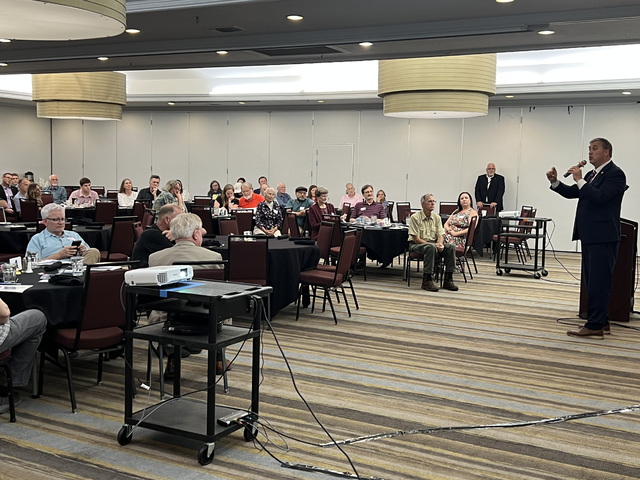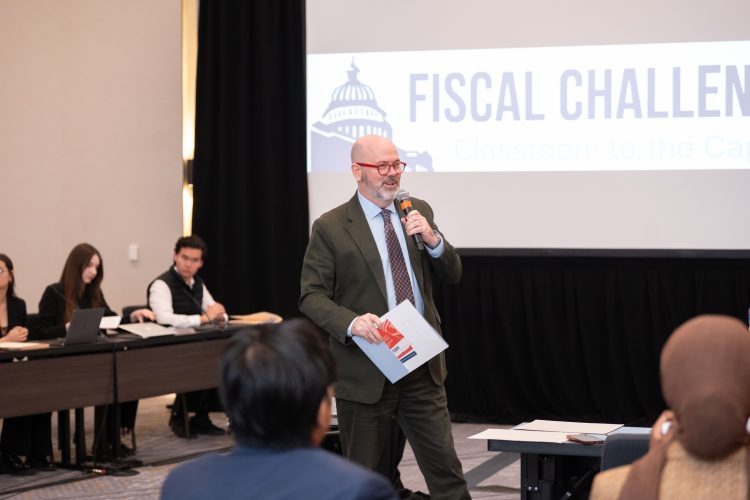November 22, 2011
Many people were urging members of the deficit reduction super committee to “go big.” Now it appears that they will just go away. It’s yet another disappointment in a year that has seen many failed attempts at a “grand bargain” on fiscal policy.
Many people were urging members of the deficit reduction super committee to “go big.” Now it appears that they will just go away. It’s yet another disappointment in a year that has seen many failed attempts at a “grand bargain” on fiscal policy.
Unfortunately, the problem that the super committee was supposed to address – our nation’s unsustainable fiscal policy – remains. So the mission of the super committee must go on even as the committee itself shuts down.
So, what’s next?
The most immediate concerns are the end-of-the-year expiration of the payroll tax cut, relief from the Alternative Minimum Tax (AMT), scheduled cuts in Medicare physician reimbursement rates and extended unemployment compensation. Failure to renew these policies has the potential to harm economic growth in the fragile economy. Yet if enacted alone, all would increase the deficit.
Looking ahead to the end of 2012, Congress will be preparing to face the first set of spending cuts from the $1.2 trillion trigger at the same time that the so-called “Bush tax cuts” are due to expire.
All of these impending decisions are likely to again tie Congress in knots as it worries about deficit reduction while keeping in place a number of policies it likes that increase deficits. Before that happens, it’s a good idea to ask: What would happen if Congress simply did nothing?
From a strictly budgetary standpoint, the results would be pretty good. In fact, Congress has the ability to “go big” on deficit reduction by doing nothing. It may not be the most thoughtful approach, but if gridlock prevails, spending will be cut, taxes will go up and the deficit will shrink to a much lower level than would have been achieved if the super committee had hit its minimum target of $1.2 trillion in deficit reduction.
According to the Congressional Budget Office (CBO), if current law is followed the budget would reach primary balance (total spending minus interest payments equals revenues) by 2014, and debt held by the public would shrink from 67 percent of the gross domestic product (GDP) to 61 percent of GDP by 2021.
This result would be far better than anything put forward by the two sides in the super committee deliberations. It would also go bigger than the end result of many “go big” proposals, which generally call for about $4 trillion in deficit reduction but are vague on what number this $4 trillion should be subtracted from.
It makes quite a difference. If you start with the assumption that current law won’t take effect and that deficits will thus total around $9 trillion over the next 10 years, cutting them by $4 trillion still leaves you with $5 trillion in deficits. But if you start with the current-law baseline of $3.5 trillion in deficits over the next 10 years and devise policies to hit this mark, you’ve actually done better than the go big goal.
For example, the bi-partisan Bowles-Simpson fiscal commission is justifiably cited as the benchmark for a serious deficit reduction effort. And yet, even under the commission’s framework the deficit would shrink to 1.5 percent of the gross domestic product (GDP) in 2021 as opposed to the projected current-law deficit of 1.2 percent of GDP. Viewed from that perspective, the commission’s plan would actually increase the deficit.
Meeting the baseline target does not mean that Congress must stick to a literal interpretation of current law. They just have to find policies that would achieve the same results. Under current law, revenues are scheduled to rise to 20.9 percent of GDP while spending falls to 22 percent of GDP. Maintaining the current-law level of revenues, for example, is possible either under the scheduled expiration of the Bush tax cuts, or if any extended tax cuts are offset with some other increase in revenues. And if policymakers want a different mix of revenues and spending they should be free to rearrange things so long as the deficit reduction total remains on track.
One option they must not resort to is any attempt to reduce the $1.2 trillion of deficit reduction triggered by the failure of the super committee to reach agreement. This trigger was agreed to as a backup mechanism to ensure that the deficit reduction in last summer’s deal to raise the debt limit would be achieved. The savings are assumed in the baseline and are being counted on by financial markets. Repealing the trigger or reducing its effect would be yet another betrayal of fiscal responsibility, eroding the credibility of Congress further and potentially leading to a downgrade of the nation’s credit rating.
There is still time to get things right before expensive, deficit-financed policies are extended as usual. A commitment to a process that enforces strict pay-as-you-go rules and guides policies toward the goal of current-law deficits would put the budget on an economically sustainable track, at least temporarily, even as the specifics of the tax and spending policies are still being developed.
But Congress also needs to look beyond the 10-year budget window. The real test of any deficit reduction plan is not how much it cuts in the near term but whether the savings expand over time to produce a sustainable fiscal policy. And that is one thing that sticking to the current law baseline will not do. Medicare, Medicaid and Social Security are all growing faster than the economy and faster than projected revenues, even if the Bush tax cuts expire. That is why no fiscal plan will have long-term credibility without cost-saving reforms of these programs.
It will also be important to broaden the discussion beyond the back rooms of Capitol Hill. The issues at stake — from social insurance to national security, domestic investments and tax reform — have profound consequences for our nation’s future. Setting priorities and allocating resources are not a simple matter of “winning” a partisan debate. Compromise will be necessary, and the American people must be brought into that process.
The Concord Coalition’s deficit-reduction exercises and other public engagement efforts in cities across the country have consistently shown that people of all ages and varied ideologies strongly support substantial deficit reduction and are willing to make some hard choices, so long as there is shared sacrifice with everything on the table.
Just as they did for the State of the Union Address, members of Congress should pair up. They should join together in “two-by-two” fiscal forums in which they present agreed-upon facts and engage with each others’ constituents about policy options. Public engagement is of little value if it just means listening to people who already agree with you.
Two-by-two forums would broaden understanding of the key issues and promote civic discourse about solutions. Moreover, through media coverage and social networking, they would have an impact far beyond those citizens who attend. By appearing together, agreeing on some basic facts, and working through the trade-offs of potential solutions, policymakers could begin to win back public trust and help reach consensus on difficult decisions. It would certainly be an improvement over the typical exchange of tired talking points that has led to the current stalemate. A good example was set earlier this year by Senators Mark Warner (D-Va.) and Saxby Chambliss (R-Ga.), who held joint forums in Richmond and Atlanta.
There are, of course, other considerations than the budget’s bottom line. Specifically, there is a legitimate short-term concern that spending cuts or tax increases implemented too soon would harm the fragile economy. There is also a legitimate concern that the brunt of any deficit reduction plan should not be borne by those who can least afford it.
These issues, too, must be dealt with, and they indeed can be in a manner completely consistent with the strategy of not exceeding current-law deficits over the next decade. These are solvable problems, not yet an unavoidable crisis. But they do need to be solved, which means that just going home is not necessarily the wisest strategy after all. Congress still has much work to do.
Last updated: November 22, 2011
Continue Reading
Related Content

News
Texans Tackle the Budget: A Constructive Conversation in Tyler and Longview

News
Engaging Future Leaders at the University of Iowa

News
Engaging the Next Generation in Carrollton: Federal Budget Conversations at the University of West Georgia

News
Shaping the Future at the 2025 Fiscal Challenge Finals presented by the Peter G. Peterson Foundation

News
Budget Experts Across Partisan Divides Agree Congress Should Use Consistent, Rational, and Transparent Measures of Costs and Savings

News
The Senate Budget Committee’s Fantasy Plan Would Add Nearly $6 Trillion to the Debt

News
Engaging Future Leaders at American University

News
We Need a Real Discussion About Reforming Social Security to Prevent Insolvency and Benefit Cuts – Not More Fake News

News
Kerrey-Danforth Commission Findings Still Need Solutions Thirty Years Later

News
Means-Testing Federal Benefits and Tax Expenditures

News
Historical Tax Rates: The Rhetoric and Reality of Taxing the Rich

News
The President’s Budget in Green, Yellow, and Red